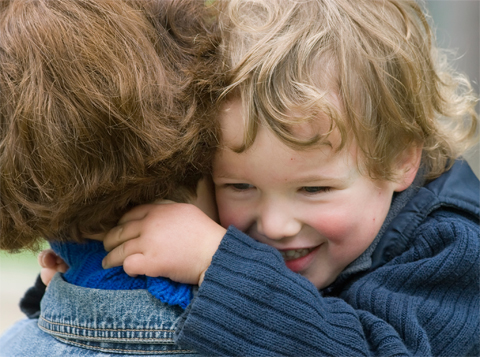“A new commandment I give to you, that you love one another: just as I have loved you, you also are to love one another. By this all people will know that you are my disciples, if you have love for one another” (John 13:34-35 ESV).
How Kids Think
Children wonder, “Does anyone really love me?“ Students are aware that human love often comes with conditions and exceptions. They hear about people who are passionately “in love” who soon find themselves infatuated with someone else. They are often exposed to selfish, performance-based love that’s “here today, gone tomorrow.”
How God Thinks
God’s unconditional love is selfless; it remains constant regardless of circumstances. In the Bible, love is not a feeling or emotion; it is something we see in action. Love has arms and legs that serve. Love is the disciplined will and resolve to seek the welfare of others. Selfless love motivated Jesus Christ to abandon heaven’s glory. Love allowed Him to wash His disciples feet and willingly take a lowly position. Love kept Him on the cross, paying for the sins of His beloved. God calls us to show agape love to one another, a love that selflessly gives without expecting anything in return.
True Story
Charles and Debbie adored their kids. Debbie claimed that she wanted these words carved on her gravestone, “She loved her kids!” Dad and mom worked hard to create and maintain a family atmosphere of daily affection, attention, and delight. As their uniquely wired children grow, Charles and Debbie remain determined to express love to each one.
Their son, Brian, loves to wrestle, be thrown around, and to play actively. Muted chuckles warn dad whenever Brian is about to pounce. Some hugs are gentle, but others turn into wrestling throw-downs. These interactions give Brian absolute assurance of his father’s love and care.
Alyssa, their young daughter, has very different needs for affection. She likes to interact through animated facial expressions and open conversations. She responds enthusiastically to this kind of attention. As Alyssa’s parents delight in her uniqueness, she blossoms and grows into a confident and contagiously joyful child.
Personal Example
My Sunday school class of kindergarteners listened to the story about Jesus walking on water. Then the children moved to the craft table to begin painting. Little Holly accidentally spilled paint all over the table, and some even leaked onto the carpeted floor. Holly was very upset that she had stained the carpet—big tears started to fall. Jeremiah, her classmate, walked up to Holly and confidently stated, “This is church…so mistakes are okay here.”
The little girl looked at him wide-eyed—then began to nod. He repeated, “It’s okay here Holly; mistakes are okay.” I knew that Jeremiah had learned this lesson from his mom just the week before—when he had made a huge mistake. I was amazed at Jeremiah’s ability to pass on this lesson of love so quickly after his own recent experience!
Holly stopped crying. Her classmates rallied around to help clean up and to reassure her that the mess was truly okay. Before long, the paint was mostly gone and the tears had dried up. Jeremiah personified a living example of the love and forgiveness that church communities need to display. Believers can model the truth that love that is unconditional—not something to be earned or lost when we mess up. Mistakes are okay here—we are loved!
What You Can Do
Dispense generous doses of selfless, unconditional love to your kids. Proclaim openly and frequently, “I love you!” Remind your children that God loves them, too.
- Model selfless love (1 Corinthians 13:4-7). Children need undiluted affection that consistently mirrors the qualities described in the “love chapter.” God’s Spirit empowers us to love others in this way.
- Choose love (1 Peter 4:8). Avoid letting your emotions dictate your response. Filter your actions through the lens of love that “covers a multitude of sins.”
- Pay attention to how your children receive love. Ask the Lord to help you identify their “love language.” Then find creative ways to express love in ways it will truly be appreciated.
- After discipline, affirm your love (1 John 4:16-18). When your children make a mistake and receive appropriate consequences, use the post-discipline moments to teach unconditional love. Affirm and embrace the offender until his or her body language indicates that your love has been received.
__
Discipleship Begins With Our Children
Children need meaningful, shared-life relationships. That’s the heart of discipleship. DiscipleLand’s family of Biblical resources forms a complete Children’s Discipleship System™ – an intentional, relational, and transformational process designed to help children know God intimately, love Him passionately, and to serve Him selflessly. Click here for your Free Catalog
Learn more by clicking on the following:
• Samples
• Nursery and Toddler
• Preschool
• Kindergarten
• Elementary
• Kids Church
• Midweek
• Free Catalog








I love this article and I am passing along the link to the parents in our children’s ministry. Teaching children about God’s unconditional love and modeling it in the home is so important. Thanks so much for this resource.
The best curriculum! This is how we follow Jesus command and make disciples.
I have been teaching 3rd graders for almost 25 years, with the help of my wife of 35 years. When the kids come to me to give me a hug, I have to be very careful how I manage it without seeming cold & indifferent. Whereas, my female counterparts can take a more “nurturing and affectionate” approach. I would like to here from other male teachers on this issue. Sometimes, being the only “constant” male figure that they can feel comfortable with, has its own set of problems. But, years later when they give me their “babies” to hug, God lets me know I’ve established that connection.